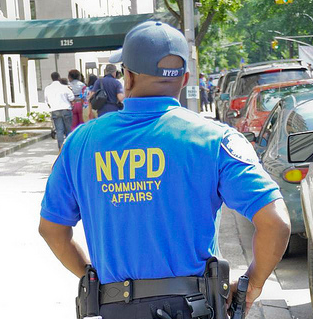BREAKING: Key Parts of NYPD's Stop And Frisk Program Ruled Unconstitutional
 A major step forward. The NYPD systemic racial profiling program should be completely abolished!
A major step forward. The NYPD systemic racial profiling program should be completely abolished!
via NY TIMES
(flickr: j-No)
###
By JOSEPH GOLDSTEIN Published: January 8, 201
A federal judge ruled on Tuesday that the New York Police Department’s practice of stopping people suspected of trespassing outside private buildings in the Bronx was unconstitutional.
The decision appears to be one of the more significant federal rulings during the Bloomberg administration on the Police Department’s use of stop-and-frisk tactics, which the administration has credited with helping lower crime rates in the city.
The case was narrowly focused on police stops in front of the private residential buildings enrolled in the Trespass Affidavit Program in the Bronx. Under that program, which includes several thousand residential buildings, property managers have asked the police to patrol their buildings and to arrest trespassers.
But Judge Shira A. Scheindlin of Federal District Court in Manhattan ruled Tuesday that the Police Department was routinely stopping people outside such buildings without reasonable suspicion that they were trespassing.
“While it may be difficult to say where, precisely, to draw the line between constitutional and unconstitutional police encounters, such a line exists, and the N.Y.P.D. has systematically crossed it when making trespass stops outside TAP buildings in the Bronx,” Judge Scheindlin ruled.
“For those of us who do not fear being stopped as we approach or leave our own homes or those of our friends and families, it is difficult to believe that residents of one of our boroughs live under such a threat. In light of the evidence presented at the hearing, however, I am compelled to conclude that this is the case.”
The lawsuit, Ligon v. the City of New York, is one of three related cases involving stop-and-frisk practices before Judge Scheindlin. The broadest reaching case accuses the police of stopping and frisking hundreds of thousands of people a year solely on the basis of race; Judge Scheindlin granted that lawsuit class-action status in May. The third case challenges police stops at public housing projects.
In the decision released on Tuesday, the judge ordered the police “to cease performing trespass stops” outside the private buildings in the program unless officers have reasonable suspicion, a legal standard that requires police officers to be acting on more than just a hunch.
The fact that a person was merely seen entering or leaving a building was not enough to permit the police to stop someone, “even if the building is located in a high-crime area, and regardless of the time of day,” the judge ruled. Nor was it enough for an officer to conduct a stop simply because the officer had observed the person move furtively, Judge Scheindlin said. (The forms that the police fill out after each street stop offer “furtive” movements as a basis for the stop).
Judge Scheindlin also called for a hearing to discuss possible remedies. At that hearing, she said, she will consider requiring the Police Department to create a formal written policy “specifying the limited circumstances in which it is legally permissible to stop a person outside a TAP building on a suspicion of trespass,” and to revise the training of officers and to alter some of the training literature and videos used to teach officers how to conduct lawful stops.
The judge cited evidence presented at a lengthy hearing in October that many of the people stopped were in fact guests of tenants and had a right to be in the buildings.
“Because any member of the public could conceivably find herself outside a TAP building in the Bronx, the public at large has a liberty and dignity interest in bringing an end to the practice of unconstitutional stops at issue in this case,” the judge wrote.
Judge Scheindlin observed that “enforcing constitutional restrictions” in the case could restrict the police’s ability to provide security to the residents of those buildings.
The police have argued that the Trespass Affidavit Program is an important tool that allows them to enforce a degree of peace and quiet in buildings that do not have doormen and where residents contend with drug sales and disorder in their hallways.
But Judge Scheindlin found “that the public interest in liberty and dignity under the Fourth Amendment trumps whatever modicum of added safety might theoretically be gained from the N.Y.P.D.'s making unconstitutional trespass stops outside TAP buildings in the Bronx.”












Be the first to comment
Sign in with